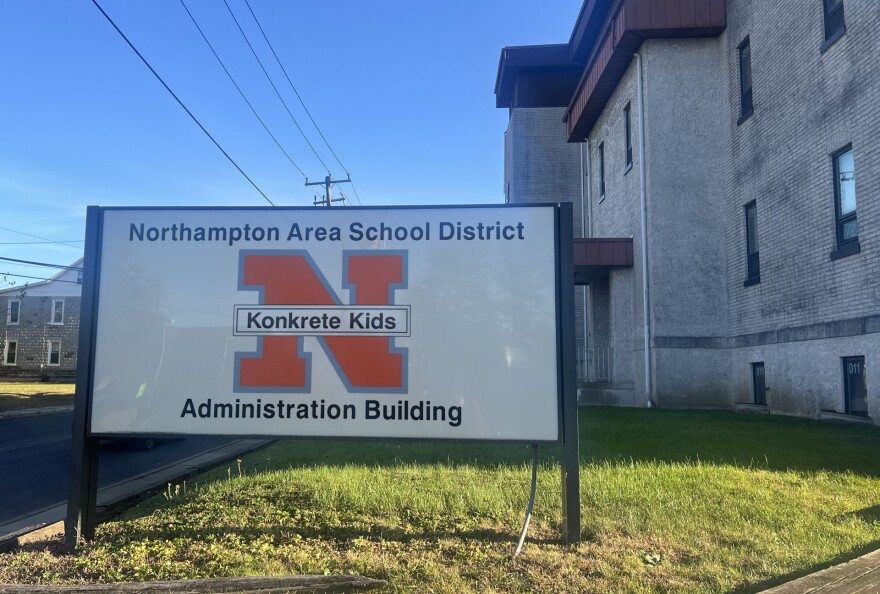NORTHAMPTON, Pa. — Northampton Area School Board has launched an investigation into whether the district violated the state's open meetings law when it authorized overtime work for a summer facilities project.
The heating, ventilation and air conditioning project at George Wolf Elementary School in Bath remains on a tight schedule as engineers, contractors and tradespeople try to finish work before the school year starts Aug. 25.
The time crunch was caused by roadblocks at the school site, such as masonry opening issues and unanticipated pipes that made the installation of ductwork more difficult.
As a result, the school district directed contractors to take the necessary actions to open George Wolf on time, thus avoiding remote learning or other contingency plans for students throughout September.
That’s as long as all goes well at the school site over the next week.
The contractors have been doing strategic work at the school to deal with unforeseen site issues and enlisting workers for overtime hours to stick to the project’s timeline.
Those actions have resulted in additional costs to the district.
The decision to proceed with the project full steam ahead was made before the school board formally voted to approve the work and allocate the needed funding.
CHA Consulting, the engineering and construction management firm handling the George Wolf project, said at a school board meeting Monday that overtime work had already begun at the site.
There were 600 hours of extra work put in at George Wolf just during the 10-day period from July 25 to Aug. 3. That’s the equivalent to 15 extra craftspeople working 40-hour work weeks.
Potential Sunshine Act Violation
Though the school board retroactively approved the George Wolf decision at Monday’s meeting, school Director Brian McCulloch said deliberation had happened “behind closed doors, out of the public eye in violation of the Sunshine Act.”
The Pennsylvania Sunshine Act governs the procedures for open meetings and “requires agencies to deliberate and take official action on agency business in an open and public meeting,” according to the Office of Open Records.
After McCulloch publicly raised his concerns, school directors unanimously agreed to have the district’s solicitor investigate the board’s and the district administration’s handling of the ongoing HVAC project, particularly as it relates to discussions about the project timeline and recent change orders.
Melissa Melewsky, in-house counsel for the Pennsylvania NewsMedia Association, told LehighValleyNews.com on Wednesday that school districts “as a whole” have to comply with the Sunshine Act, and they do that through the actions of their school boards.
“We want public officials to understand their duties and exercise them appropriately, and if an investigation by their own counsel can do that, then that’s a good thing.”Melissa Melewsky, in-house counsel for the Pennsylvania NewsMedia Association
But school directors don’t always get legal advice on Sunshine Act compliance before they take action. She said if Northampton Area’s goal is to learn from any potential mistakes, then an investigation is a positive move.
“Ultimately, the goal of the Sunshine Act is compliance, not penalty,” Melewsky said.
“We want public officials to understand their duties and exercise them appropriately, and if an investigation by their own counsel can do that, then that’s a good thing.”
Director McCulloch also said he would hire his own lawyer to investigate whether a Sunshine Act violation occurred.
Additionally, he plans to ask the office of Auditor General Timothy DeFoor to review the matter.
Superintendent actions challenged
McCulloch said Superintendent Joseph Kovalchik “bullied” school directors into having a private debate via email about $195,000 worth of overtime pay and unanticipated work costs at the George Wolf site.
The project initially was approved by school directors in January at a cost of $5.77 million.
McCulloch accused the superintendent of providing “illegal unjustified authorization” to contractors.
He said Kovalchik pushed the board to take a straw poll before an official vote so contractors knew how to proceed on the facilities project over the past couple weeks.
PNA attorney Melewsky said straw polls are problematic because they happen outside of public meetings and they don’t allow for public input.
“Public input plays a very important role in, or is supposed to play a very important role, in the decision-making process,” she said.
Superintendent pushes back
In response to McCulloch, Kovalchik said discussions amongst school directors happen outside board meetings “all the time,” such as when a group of school directors attends a district event or tours district buildings.
He also said the school board regularly approves decisions retroactively after the district has already taken action, such as with paying utility bills each month, or hiring staff members.
Additionally, the superintendent said he needed direction on how to move forward on the George Wolf project “ASAP,” with the upcoming school year quickly approaching.
Kovalchik said the issues raised by McCulloch should prompt the board to discuss how it wants the administration to act “on a whole host of things moving forward” as it relates to timelines and communication.
‘Very possible to run afoul of the law’
PNA attorney Melewsky said just because scenarios happen often doesn’t make them compliant with the law.
As it relates to information gathering, Melewsky said school directors can receive information from the superintendent or others by asking questions, but that information should only be discussed as it relates to decision-making at a later time in a public meeting.
She also said “it is very possible to run afoul of the law via email,” but said she couldn’t comment on Northampton Area’s situation because she hadn’t viewed the email conversations about the George Wolf project.
“The law defines deliberation as ‘the discussion of agency business held for the purpose of making a decision,’" Melewsky said.
"So that implies there is some back-and-forth discussion amongst a quorum of the members about a particular issue.”
Melewsky also said the decision to continue the George Wolf project amid its challenges is different from those scenarios offered up by the superintendent as examples of precedent for district action before board approval.
A job offer should be made by the district on the condition of board approval, she said. And the administrative payment of utility bills falls under a previously approved contract.
In the case of the George Wolf project, the district has “essentially” created “a new contract or at least a new term of a contract,” she said.
Unanticipated work at George Wolf
School directors ultimately voted 8-0 Monday to approve the change orders for the overtime pay and unanticipated work at George Wolf. McCulloch abstained from the vote.
One change order included up to $135,000 to the mechanical contractor for overtime requirements, as well as additional work, such as the rerouting of piping.
A second change order included up to $60,000 to the general contractor for new costs, such as for enclosures to accommodate ductwork.
The board also approved $25,000 for lightning protection of a rooftop HVAC device.
“I arbitrarily, single-handedly, autonomously did not make a decision to do this. And I never have done anything like that unless it comes [to] a snow day.”Joseph Kovalchik, Northampton Area Superintendent
Superintendent Kovalchik said he consulted with board President Kristin Soldridge when he first learned of the cost estimates for urgent issues that threatened the timeline of the project.
Kovalchik said it is standard practice to consult with board leadership when such issues occur.
“I arbitrarily, single-handedly, autonomously did not make a decision to do this,” he said. “And I never have done anything like that unless it comes [to] a snow day.”
Timeline of site issues
At the end of July, Kovalchik received a memo from CHA Consulting, he said.
It detailed the cost estimates for addressing the unforeseen issues that workers had encountered at George Wolf, along with recommendations from CHA on how to proceed.
“So that email chain went around and certain board members asked specific questions [about] why this was all occurring,” Kovalchik said.
“[They asked] valid questions, which they should be doing if you’re paying X amount of dollars for whatever, and those were the questions that were discussed.”
Kovalchik said the district had only spent about $3.1 million on the project thus far, and there was about $1.6 million left in a bond fund to move forward.
“There was enough money in the account to do this,” he said. “We did not supersede it.”
Kovalchik said the district had to choose between continuing with the necessary work or pulling workers off the site and considering remote learning for George Wolf students to start the school year.
Concerns about potential remote learning
Engineers told the district that without overtime work, the project would have been extended at least four weeks.
"I'm pretty sure most of the people wouldn't be too happy with remote learning occurring for the first four [or] five weeks of the school year,” Kovalchik said.
“Maybe I’m wrong. I don't think so, but maybe I’m wrong.”
“If it could have saved us money to let them learn remotely for [a few] weeks, so be it. I think that’s a small price to pay.”Brian McCulloch, Northampton Area School Director
But Director McCulloch supported a more frugal approach to the George Wolf challenges, even if it meant remote learning.
He said students showed they have the capability to learn online during the COVID-19 pandemic.
“If it could have saved us money to let them learn remotely for [a few] weeks, so be it,” McCulloch said. “I think that’s a small price to pay.”
School directors John Becker and Douglas Vaughn disagreed.
They thanked Kovalchik for making decisions to keep the project moving along, so students could learn in person.
“We saw what it was like during COVID when students were stuck at home working online,” Becker said. “I think it was important to get the kids in school on time.
“I appreciate your leadership on that matter,” Becker told the superintendent.
Vaughn similarly said the board should “get behind” Kovalchik “in support of what he does” for the district.
‘Every hour matters’
When asked by a school director and resident if a special meeting should have been held to debate the overtime issue, Kovalchik said he doesn’t have the power to call meetings.
He also said meetings require advertisement 24 hours in advance, and the clock was ticking on the project.
“Every hour matters,” Kovalchik said.
“You’re absolutely right, it was minute by minute, day by day. It would have caused a catastrophe. We wouldn’t have made it.”Arif Fazil, an engineer and senior business development leader at CHA Consulting
Arif Fazil, an engineer and senior business development leader at CHA, backed up the superintendent’s position on the urgency of the project.
“You’re absolutely right, it was minute by minute, day by day,” Fazil said. “It would have caused a catastrophe. We wouldn’t have made it.”
Fazil said there’s been a “significant push” over the past few weeks to finish the project in time for school.
“The strategic and surgical work we did is impactful,” he said.
School Director Ross Makary, who recently toured the school site, said the quality of work at George Wolf has not suffered because of the time constraints.
“Once we got out there and saw the difficulty involved in what was there — I think we are getting our money’s worth and a quality job,” he said.


